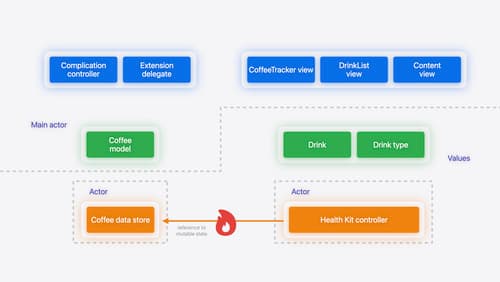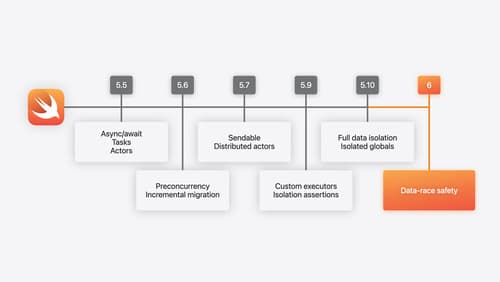modern grand central dispatch
Asked on 2024-10-03
1 search
The content from the WWDC sessions you provided focuses on concurrency and data-race safety in Swift, particularly with the transition to Swift 6. Modern Grand Central Dispatch (GCD) is not explicitly mentioned, but the sessions discuss concurrency management and improvements in Swift 6, which are relevant to GCD's role in handling concurrent tasks.
In the session "Migrate your app to Swift 6," there is a focus on adopting Swift concurrency to replace ad hoc concurrency architectures, which might have previously relied on GCD. The session highlights the transition to using actors and the main actor for organizing concurrency, which can simplify and make concurrency management more explicit compared to traditional GCD usage.
Additionally, the session "What’s new in Swift" introduces low-level synchronization primitives like atomics and mutexes, which provide efficient, lock-free implementations for concurrent access, potentially complementing or replacing some GCD use cases.
For more detailed information on concurrency improvements in Swift 6, you can refer to the following sessions:
- Migrate your app to Swift 6 (Swift 6 and data-race safety)
- What’s new in Swift (Low-level synchronization primitives)
These sessions provide insights into how Swift 6 enhances concurrency management, which could be relevant to developers familiar with GCD.

Migrate your app to Swift 6
Experience Swift 6 migration in action as we update an existing sample app. Learn how to migrate incrementally, module by module, and how the compiler helps you identify code that’s at risk of data races. Discover different techniques for ensuring clear isolation boundaries and eliminating concurrent access to shared mutable state.

What’s new in Swift
Join us for an update on Swift. We’ll briefly go through a history of Swift over the past decade, and show you how the community has grown through workgroups, expanded the package ecosystem, and increased platform support. We’ll introduce you to a new language mode that achieves data-race safety by default, and a language subset that lets you run Swift on highly constrained systems. We’ll also explore some language updates including noncopyable types, typed throws, and improved C++ interoperability.
